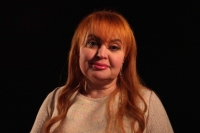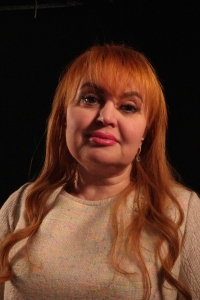I remember when bread was delivered by boats to Sviatohirsk, to Lyman because the bridges were destroyed. I remember Ukrposhta. I remember the children who were pulled out of basements. And when I’m asked, “What do you need?” I say, “Sanitizers. For now, give us sanitizers.” And we’ll feed [people] with bread. And I remember, after that, after the liberation, the first New Year we spent in safe bomb shelters in Sviatohirsk, in Lyman. Those children were like little wolf cubs. They were so happy with the gifts, like all children. This year, we’ve dedicated a lot to giving children gifts for New Year’s. It’s hard to talk about some recovery now. We understand that the enemy is right here. Well, the burned vehicles has been cleared, trees are somehow being removed. Sviatohirsk. And that’s thanks to ordinary people. Regular, ordinary people. There’s no need for this there. It’s great that there’s no need to tell them, “Go clean up.” They [just] get up [and do it]. We see it in [the aftermath] of the strikes. In Sloviansk, when a strike hit at seven in the morning, by the time I was driving in the evening, everything was cleaned up. I live near the military enlistment office. When a strike hit the enlistment office at nine, I had just passed by. I was driving, there were so many cars, and thought, “Oh God, so many military vehicles.” You know, as they say, I jinxed it. And just as I got to work — boom. My husband calls and says, “It’s near us. Well, thank God.” By the time I was driving in the evening, everything was cleaned up. That’s thanks to our municipal workers — it’s their feat. It’s incredibly hard. It’s incredibly hard, it’s constant work, regardless of time, place, and everything. That’s why the Donetsk region is strong, it will endure, I understand that. We will rebuild everything. But it’s a pity. Within the framework of the Great Construction program [a government initiative launched in 2020], so much was done. Schools so good that I’d envy studying there even now. And when children talk about it, I tell them, “You know, when we opened those schools, when we attended the openings, we understood this program.” And the roads. What roads do we have? As a driver, I can say it was a miracle. And the schools, kindergartens, hospitals, equipment, everything. As I said, it’s the envy of our enemies. They understand — they don’t have anything like that. And there are examples of this. When they are surprised by our homes, even the simplest ones. It’s not like we’re talking about palaces here. This is about simple homes. That is, I understand that Ukraine will remain strong, independent, no matter what. You know, challenges are given to the strongest. That’s why we will endure them.


